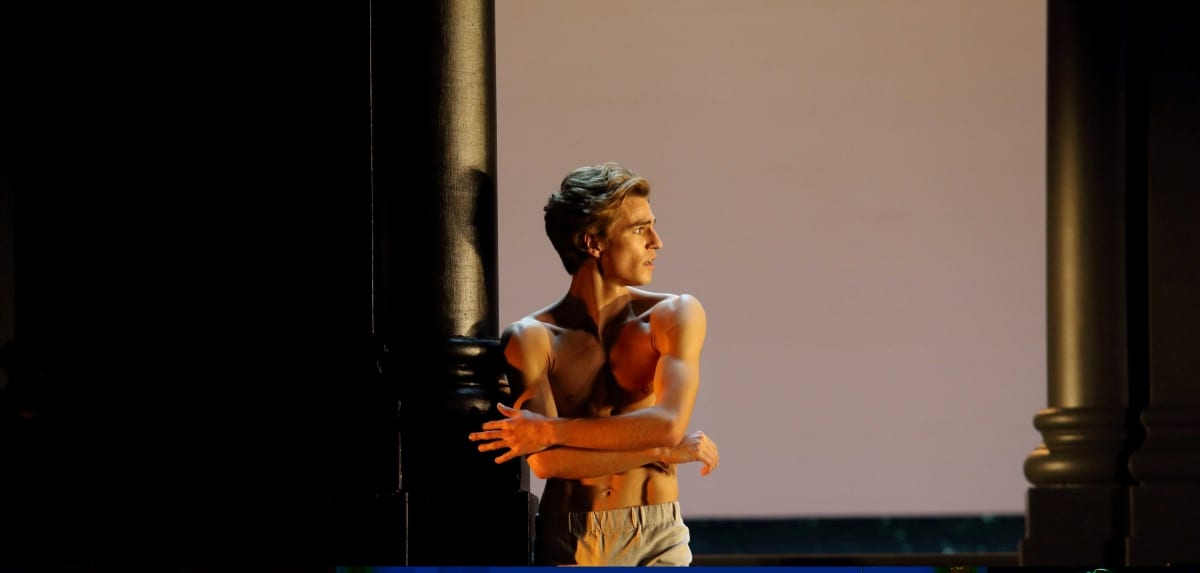This opera is one where the biographical context of the composer is more than usually relevant. With his health failing in the early 1970s and a heart operation looming, Britten wished to provide his partner, Peter Pears, with the gift of a final major role. But he also hoped through the Mann novella to achieve a final exploration of some of the key themes of his personal journey and artistic career. This is a much tougher-minded, darker treatment of the story that you find in Visconti’s lush film version: Britten probes the complexities of Eros with an unblinking eye. He also stands back from the narrative to pit the rival claims of Apollo and Dionysus against one another, a perennial theme for any artist self-critical about the rival demands of craft and inspiration. It is a remarkable achievement from a composer who knew he had little time left and wanted one last reckoning with his own troubled and in some ways troubling psyche.
This is a work that needs to be seen and the first hurdle any successful production needs to clear is that it has to be visually stunning. If you listen to the piece on the radio it can come over as dry and etiolated; but when presented, acted and sung as it was here at Covent Garden there is almost a bit too much ‘reality’, in the T.S. Eliot sense. Above all you need a vision of Venice as ‘La Serennisima’ – sparkling, shimmering, gilded, and sophisticated to be sure; but also with an edge of sloth, slime and sinister sleaze. Exquisite lighting from Paule Constable and thoughtful suggestive design from Vicki Mortimer gives us all that we need to feel Aschenbach’s successive temptations, torpor, tensions and terror. Emblematic of the scenic success is the use of a gondola sliding languorously across the stage with just a touch of human propulsion and alternately sunlit and shadow-filled lighting worthy of Tuke and Sargent.
Myfanwy Piper provided Britten with a skilful, concise libretto that manages to be seriously philosophical , while dodging pretension and remaining down to earth. This can be a challenge to lesser singers, but the cast in this case fully have the measure of it and of Britten’s music, much of which is written as a kind of elevated recitative. Mark Padmore makes an exceptional Aschenbach, quite eclipsing other famous incarnations of this role. The tensions he experiences are dramatically convincing and the psychological complexity of the role is vividly sketched, ranging from writer’s block through to sensual temptation, aesthetic resistance and final fatalism. Moreover, the role is truly sung rather than articulated, squeezing tonal beauty out of a score that is usually viewed as wintry.
The supporting roles are equally well cast. Gerald Finley has seven cameos to bring off, all of them underhand suborners of the central character, which he achieves with his usual brio and invention. He finds an edgy, unsettling, comedy which offers just the right balance, especially in the crucial barber shop scenes, and in the episode with the visiting troop of actors. Tim Mead sings with finesse in the ballet sequences on the Lido and there is strength in depth down through all the little character parts that populate the hotel and canal-side scenes. A special mention should go to the silent danced role of Tadzio, the object of Aschenbach’s obsession. Leo Dixon is more knowing than usual in this role, but this quality helps evoke and sustain the hidden connection and special charge between these two characters.
For and around him Lynne Page has devised a choreography that is superbly suited to the random energetic outbursts and self-conscious cockiness of teenagers growing into their sexuality. In an opera where there is a lot of looking but little action you badly need to see the feel the source of Aschenbach’s infatuation; and here, for once, you do. In the pit Richard Farnes extracts playing of both refinement and power from the orchestra, and the chorus sing with a precision and attack that evoke briefly some of the fiercer moments in ‘Peter Grimes’.
There is no doubt that this is as uncomfortable and bleak an opera as anyone could (not) wish for; but this production is a must not just for devotees of Britten’s music but really for anyone who looks at life primarily through the imperatives of an aesthetic perspective.

